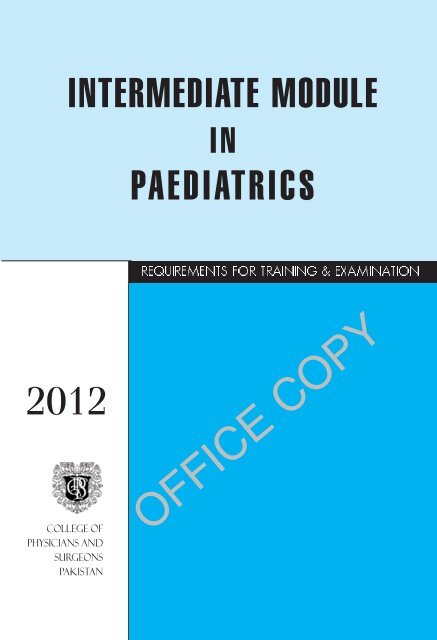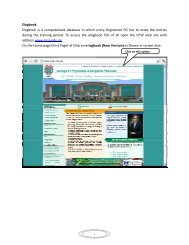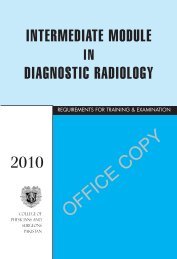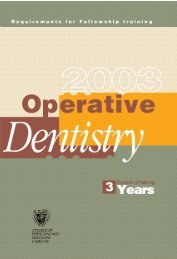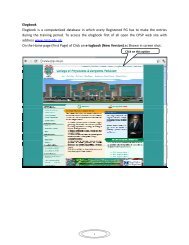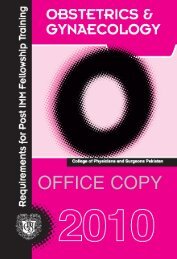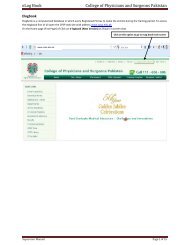OFFICE COPY - e-Log Book - College of Physicians and Surgeons ...
OFFICE COPY - e-Log Book - College of Physicians and Surgeons ...
OFFICE COPY - e-Log Book - College of Physicians and Surgeons ...
You also want an ePaper? Increase the reach of your titles
YUMPU automatically turns print PDFs into web optimized ePapers that Google loves.
INTERMEDIATE MODULEINPAEDIATRICSREQUIREMENTS FOR TRAINING & EXAMINATION2012;GDD=?= G>H@QKA;A9FK 9F
Composed by:Syed Faisal BabarDepartment <strong>of</strong> Medical EducationPublished: August, 2012COLLEGE OF PHYSICIANS AND SURGEONS PAKISTAN7th Central Street, Defence Housing Authority, Karachi-75500.Phone No. 99207100-10 UAN: 111-606-606 Fax No. 99266432B
CONTENTS1ABOUT THE COLLEGE4TRAINING AND EXAMINATION7ASSESSMENT9COURSE FOR BASIC PAEDIATRICS TRAINING34USEFUL ADDRESSES AND TELEPHONE NUMBERSC
About theCOLLEGEThe <strong>College</strong> was established in 1962 through an ordinance <strong>of</strong> theFederal Government. The objectives/functions <strong>of</strong> the <strong>College</strong> includepromoting specialist practice <strong>of</strong> Medicine, Obstetrics & Gynaecology,Surgery <strong>and</strong> other specialties by securing improvement <strong>of</strong> teaching<strong>and</strong> training, arranging postgraduate medical, surgical <strong>and</strong> otherspecialists training, providing opportunities for research, holding <strong>and</strong>conducting examinations for awarding <strong>College</strong> diplomas <strong>and</strong>admission to the Fellowship <strong>of</strong> the <strong>College</strong>.Since its inception, the <strong>College</strong> has taken great strides in improvingpostgraduate medical <strong>and</strong> dental education in Pakistan.Competency-based structured Residency Programs have now beendeveloped, along with criteria for accreditation <strong>of</strong> training institutions,<strong>and</strong> for the appointment <strong>of</strong> supervisors <strong>and</strong> examiners. The format<strong>of</strong> examinations has evolved over the years to achieve greaterobjectivity <strong>and</strong> reliability in methods <strong>of</strong> assessment. The recognition<strong>of</strong> the st<strong>and</strong>ards <strong>of</strong> <strong>College</strong> qualifications nationally <strong>and</strong>internationally, particularly <strong>of</strong> its Fellowship, has enormouslyincreased the number <strong>of</strong> trainees <strong>and</strong> consequently the number <strong>of</strong>training institutions <strong>and</strong> the supervisors.The rapid increase in knowledge base <strong>of</strong> medical sciences <strong>and</strong>consequent emergence <strong>of</strong> new subspecialties have graduallyincreased the number <strong>of</strong> CPSP fellowship disciplines to sixty fourAfter completing two years <strong>of</strong> core training during IMM, the traineesare allowed to proceed to the advanced phase <strong>of</strong> FCPS training in thespecific specialty <strong>of</strong> choice for 2-3 years. However, it is m<strong>and</strong>atory toqualify IMM examinations before taking the FCPS-II exitexaminations including specialties in dentistry.The work performed by the trainee is to be recorded in the e-Iogbookon daily basis. The purpose <strong>of</strong> the e-Iog is to ensure that the entriesare made on a regular basis <strong>and</strong> to avoid belated <strong>and</strong> fabricatedentries. It will hence promote accuracy, authenticity <strong>and</strong> vigilance onthe part <strong>of</strong> trainees <strong>and</strong> the supervisors.Intermediate Module in Paediatrics 20121
The average number <strong>of</strong> c<strong>and</strong>idates taking CPSP examinations eachyear is to a minimum <strong>of</strong> 25,000. The <strong>College</strong> conducts examinations forFCPS I (11 groups <strong>of</strong> disciplines), IMM, FCPS II (64 disciplines), MCPS20 disciplines, including MCPS in HPE <strong>and</strong> also Diploma in HealthCare System Management (DCPS-HCSM). A large number <strong>of</strong> Fellows<strong>and</strong> senior medical teachers from within the country <strong>and</strong> overseas areinvolved at various levels <strong>of</strong> examinations <strong>of</strong> the <strong>College</strong>.The <strong>College</strong>, in its endeavor to decrease inter-rater variability <strong>and</strong>increase fairness <strong>and</strong> transparency, is using TOACS (Task OrientedAssessment <strong>of</strong> Clinical Skills) in IMM <strong>and</strong> FCPS-II Clinicalexaminations. Inclusion <strong>of</strong> foreign examiners adds to the credibility <strong>of</strong>its qualifications at an international level.It is important to note that in the overall scenario <strong>of</strong> health delivery over85% <strong>of</strong> the total functioning <strong>and</strong> registered health care specialists <strong>of</strong>the country have been provided by the CPSP. To coordinate training<strong>and</strong> examination, <strong>and</strong> provide assistance to the c<strong>and</strong>idates stationedin cities other than Karachi, the <strong>College</strong> has established 14 RegionalCenters (including five Provincial Headquarter Centers) in the country.The five Provincial Headquarter Centers, in addition to organizing thecapacity building workshops/short courses also have facilities <strong>of</strong> libraries,I.T, <strong>and</strong> evaluation <strong>of</strong> synopses <strong>and</strong> dissertations along with providingguidance to the c<strong>and</strong>idates in conducting their research work. Thetraining towards Fellowship can be undertaken in more than 159accredited medical institutions throughout the country <strong>and</strong> 44accredited institutions abroad. The total number <strong>of</strong> trainees in theseinstitutions exceeds 16000.Intermediate Module in Paediatrics 2012These continuous efforts <strong>of</strong> the <strong>College</strong> have even more importantlydeveloped a credible system <strong>of</strong> postgraduate medical education forthe country. The <strong>College</strong> strives to make its courses <strong>and</strong> trainingprograms 'evidence' <strong>and</strong> need 'based' so as to meet internationalst<strong>and</strong>ards as well as to cater to the specialist healthcare needs notonly for this country but also for the entire region.Pr<strong>of</strong>. Zafar Ullah ChaudhryPresident<strong>College</strong> <strong>of</strong> <strong>Physicians</strong><strong>and</strong> <strong>Surgeons</strong> Pakistan2
INTERMEDIATE MODULETo ensure better training, the CPSP introduced an intermediatemodule examination in several disciplines in 2001. This mid-trainingassessment strengthens the monitoring <strong>and</strong> in-training assessmentsystems by providing trainees with an estimate <strong>of</strong> mid-training corecompetencies. It also serves as a diagnostic tool for trainees <strong>and</strong>supervisors, provides a curricular link between basic <strong>and</strong> advancedtraining, <strong>and</strong> an opportunity for sampling a wider domain <strong>of</strong>knowledge <strong>and</strong> skillsVide Notifications No. 6-1 / Exam-04 / CPS / 1438 S <strong>and</strong> R, dated July21, 2004, the Intermediate Module (IMM) examination is m<strong>and</strong>atoryeligibility requirement for all specified FCPS II examination as fromSeptember 2007. Trainees who passed FCPS I in 2001 <strong>and</strong> onwardsare required to complete two years training in Paediatrics, <strong>and</strong> takethe Intermediate Module (IMM) examination.Even if they do not appear in the IMM examination, the trainees arepermitted to continue their training in the chosen discipline but mustpass the IMM examination prior to taking the final FCPS IIexamination.Intermediate Module in Paediatrics 20123
TRAINING ANDEXAMINATIONGENERAL REGULATIONSC<strong>and</strong>idate will be admitted to the examination in the name (surname<strong>and</strong> other names) as given in the MBBS degree. CPSP will notentertain application for change <strong>of</strong> name on the basis <strong>of</strong>marriage/divorce/deed.REGISTRATION AND SUPERVISIONAll trainings must be supervised, <strong>and</strong> trainees are required to registerwith the Research <strong>and</strong> Training Monitoring Cell (RTMC) within 30 days<strong>of</strong> starting their training for the Intermediate Module. In case <strong>of</strong> delay inregistration, the start <strong>of</strong> training will be considered from the date <strong>of</strong>receipt <strong>of</strong> application by the RTMC. Registration forms are availablein RTMC <strong>and</strong> in the Regional Centers. They can also be downloadedfrom the CPSP Website. They must submit the name <strong>of</strong> theirsupervisor by the date indicated on the registration form. Training iscompulsorily monitored by an approved supervisor who is a CPSPfellow or a specialist with relevant postgraduate qualificationsregistered at the RTMC. The trainees are not allowed to worksimultaneously in any other department/institutions for financial benefit<strong>and</strong>/or for other academic qualifications.Intermediate Module in Paediatrics 2012APPROVED TRAINING CENTERSTraining must be undertaken in units, departments <strong>and</strong> institutionsapproved by the <strong>College</strong>. A current list <strong>of</strong> approved institutions isavailable from the <strong>College</strong> <strong>and</strong> its Regional Centres as well as onthe <strong>College</strong> website: www.cpsp.edu.pkDURATIONThe duration <strong>of</strong> training for the Intermediate Module (IMM) istwo years; the Intermediate Module examination is taken oncompletion <strong>of</strong> the basic training.4
BASIC PAEDIATRICS TRAININGPROGRAM FOR INTERMEDIATEMODULECOMPONENTS OF TRAININGThe two (2) years <strong>of</strong> core training in Paediatrics consist <strong>of</strong>:●●Eighteen (18) months <strong>of</strong> approved residency training inPaediatrics, <strong>and</strong>Three (3) months rotation in two <strong>of</strong> the following:- Casualty / Emergency- NeonatologyMANDATORY WORKSHOPSIt is m<strong>and</strong>atory for all Intermediate Module trainees to attendthe following CPSP certified workshops in the two years <strong>of</strong>Intermediate Module training:1. Computer <strong>and</strong> Internet Orientation2. Research Methodology <strong>and</strong> Dissertation Writing3. Communication Skills4. BLS/ NALS/PALS/NRAny other workshop/s as may be made available by the CPSP.E-logbookThe CPSP council has introduced an E-logbook system for allresidency programs. Upon registration with RTMC each trainee isallotted a registration number <strong>and</strong> a password to log on to the e-logbook on the CPSP website. The trainee is required to enter allwork performed <strong>and</strong> the academic activities undertaken in thelogbook on a daily basis. The concerned supervisor is required toverify the entries made by the trainee. This system ensures timelyentries by the trainee <strong>and</strong> prompt verification by the supervisor. Italso helps in monitoring the progress <strong>of</strong> trainees <strong>and</strong> the vigilance<strong>of</strong> the supervisors. The <strong>College</strong> has enforced the e-logbook sinceJuly, 2011Intermediate Module in Paediatrics 20125
Research (Dissertation / Two Papers)One <strong>of</strong> the training requirements for fellowship trainees is adissertation or two research papers on the topic related to the field<strong>of</strong> specialization published/accepted for publication in CPSPapproved journals. For trainees in Paediatrics the dissertationsynopsis or abstracts <strong>of</strong> the research papers must be submitted forapproval to the Research <strong>and</strong> Evaluation Unit (REU) by the end <strong>of</strong>first year <strong>of</strong> the Intermediate Module.General RequirementsTraining should incorporate the principle <strong>of</strong> gradually increasingresponsibility, <strong>and</strong> provide each trainee with a sufficient scope,volume <strong>and</strong> variety <strong>of</strong> experience in a range <strong>of</strong> settings that includeinpatients, outpatients, emergency <strong>and</strong> intensive care, rehabilitationcenter, or other.Instructional MethodologyTeaching occurs using several methods that range from formaldidactic lectures to planned clinical experiences. Aspectscovered will include knowledge, skills <strong>and</strong> practices relevant tothe discipline in order to achieve specific learning outcomes <strong>and</strong>competencies.Intermediate Module in Paediatrics 2012The theoretical part <strong>of</strong> the curriculum represents the currentbody <strong>of</strong> knowledge necessary for practice. This can beimparted through lectures, gr<strong>and</strong> teaching rounds, clinicopathologicalmeetings, morbidity/mortality review meetings,literature reviews <strong>and</strong> presentations, journal clubs, self directedlearning, conferences <strong>and</strong> seminars.Clinical learning is to be organized to provide appropriateexpertise <strong>and</strong> competence necessary to evaluate <strong>and</strong> managecommon clinical problems. Demonstration in outpatient <strong>and</strong>inpatient clinics, <strong>and</strong> procedural skills training on simulators,mannequins <strong>and</strong> patients are all practical training modalities.6
ASSESSMENTELIGIBILITY REQUIREMENTSFor appearing in Intermediate Module examination a c<strong>and</strong>idateshould have:● Passed FCPS I in Medicine or granted exemption● Registered with Registration <strong>and</strong> Training Monitoring Cell (RTMC).● Completed two years <strong>of</strong> RTMC registered training under anapproved supervisor in an institution recognized by the CPSP.A certificate <strong>of</strong> completion <strong>of</strong> training must be submitted.● Completion <strong>of</strong> entries in e-logbook along with validation by thesupervisor.● Submitted certificates <strong>of</strong> attendance <strong>of</strong> m<strong>and</strong>atory workshops.EXAMINATION SCHEDULEThe Intermediate Module theory examination are held twice a year.● Theory examinations are held in various cities <strong>of</strong> the countryusually at Abbottabad, Bahawalpur, Faisalabad, Hyderabad,Islamabad, Karachi, Nawabshah, Larkana, Lahore, Multan,Peshawar Quetta <strong>and</strong> Rawalpindi centers. The <strong>College</strong> shalldecide where to hold TOACS examinations depending on thenumber <strong>of</strong> c<strong>and</strong>idates in a city <strong>and</strong> shall inform the c<strong>and</strong>idatesaccordingly.● English is the medium <strong>of</strong> all examinations for theory <strong>and</strong>TOACS.● The <strong>College</strong> will notify <strong>of</strong> any change in the centres, the dates<strong>and</strong> format <strong>of</strong> the examination.● A competent authority appointed by the <strong>College</strong> has the powerto debar any c<strong>and</strong>idate from any examination; if it is satisfiedthat such a c<strong>and</strong>idate is not a suitable person to take the<strong>College</strong> examination because <strong>of</strong> using unfair means in theexamination, misconduct or other disciplinary reasons.EXAMINATION FEE● Applications along with the prescribed examination fee <strong>and</strong>required documents must be submitted by the last date notifiedfor this purpose before each examination.● The details <strong>of</strong> examination fee <strong>and</strong> fee for change <strong>of</strong> centre,subject, etc shall be notified before each examination.● Fee deposited for a particular examination shall not be carriedover to the next examination in case <strong>of</strong> withdrawal, absence orexclusion.Intermediate Module in Paediatrics 20127
COURSE FOR BASIC PAEDIATRICSTRAININGGENERAL OBJECTIVESUpon completion <strong>of</strong> specified training in the chosen discipline, aresident must acquire the knowledge, skills <strong>and</strong> attitudes requiredfor practice <strong>of</strong> the discipline, including its foundations in the basicmedical sciences <strong>and</strong> research scholarship in order to:● Be a competent specialist able to provide appropriate <strong>and</strong>cost-effective care to patients at all levels● Promote health <strong>and</strong> prevent disease in patients, families <strong>and</strong>communities● Practice continuing pr<strong>of</strong>essional developmentTo attain competency the trainee must achieve:●●●●Knowledge <strong>and</strong> expertise in clinical <strong>and</strong> procedural management<strong>of</strong> relevant diseasesMastery <strong>of</strong> relevant skillsEffective clinical judgment <strong>and</strong> decision making in dealingwith health problems using evidence based medicineTrainees must demonstrate the knowledge, skills <strong>and</strong> attitudesrelating to gender, culture <strong>and</strong> ethnicity pertinent to paediatrics<strong>and</strong> researchIntermediate Module in Paediatrics 20129
TRAINING FOR INTERMEDIATE MODULEThe curriculum <strong>of</strong> first two years in Paediatrics involves balanced<strong>and</strong> objective integration <strong>of</strong> basic medical sciences <strong>and</strong> essentialcore clinical knowledge in general. The trainee should be able todiagnose <strong>and</strong> manage uncomplicated conditions prevalent in theregion <strong>and</strong> recognize, stabilize <strong>and</strong> refer complicated cases.The coverage that each discipline receives below is not indicative<strong>of</strong> the relative importance placed on each discipline in the trainingprogram, or in the examination. These are guidelines <strong>and</strong> notcomprehensive definitive lists. Only minimum levels <strong>of</strong> expectedcompetence have been identified but sufficient scope, volume <strong>and</strong>variety <strong>of</strong> experience are desirable.BASIC CLINICAL KNOWLEDGEIntermediate Module in Paediatrics 2012The trainee should be able to:● Take good history● Examine the patient physically● Write correct medical records which are clear, concise <strong>and</strong>accurate● Write referral for consultation to other specialists● Demonstrate the ability to communicate clearly, considerately<strong>and</strong> sensitively with patients, relatives, other healthpr<strong>of</strong>essionals <strong>and</strong> the public● Use evidence based medicine <strong>and</strong> evidence based guidelines● Demonstrate awareness <strong>of</strong> bio-psycho-social factors in theassessment <strong>and</strong> management <strong>of</strong> a patient10
SPECIFIC CLINICAL KNOWLEDGEBy the end <strong>of</strong> second year <strong>of</strong> training in Paediatrics the traineeshould be able to independently manage children with the followingproblems / diseases:GROWTH AND DEVELOPMENTAnthropometric values■■■■■■Normal valuesRates <strong>of</strong> increment <strong>of</strong> weight, height <strong>and</strong> headcircumferenceType <strong>of</strong> measurements used in assessment <strong>of</strong> growthRates <strong>of</strong> increments in height, weight <strong>and</strong> headcircumferences in term <strong>and</strong> preterm infantsMicrocephaly <strong>and</strong> hydrocephalus identificationDysmorphology assessment <strong>and</strong> related measurementsNutrition - IYCF (Infant <strong>and</strong> young child feeding)■■■Normal nutritional requirements in term infants <strong>and</strong>children- Underst<strong>and</strong> total nutrient requirement for a child<strong>and</strong> its calculation- Failure to thriveBreast feeding- Advantages <strong>of</strong> breast feeding- Contraindications <strong>of</strong> breast feeding- Contents <strong>of</strong> breast milk, colostrum- Contents <strong>of</strong> cow milk, goat milk, formula milks <strong>and</strong>specialized formuls in special circumstances- Underst<strong>and</strong>s qualitative <strong>and</strong> quantitativedifferences between breast milk <strong>and</strong> non-human milkComplementary feeding issuesIntermediate Module in Paediatrics 201211
Child Development■■■Recognizes the normal developmental milestones <strong>of</strong>infants <strong>and</strong> children- Identify delays in developmentPreschool Child DevelopmentSchool- Normal cognitive functions- Knows school related issues- Age appropriate readiness <strong>and</strong> ability to separatefrom parents- Identify appropriate age at which child is able t<strong>of</strong>ollow directions- School screening programmes <strong>and</strong> their valuePREVENTIVE PAEDIATRICSVaccinationIntermediate Module in Paediatrics 2012■■■■Knowledge <strong>of</strong> the basic schedule <strong>of</strong> EPIIndications <strong>and</strong> contraindications <strong>of</strong> vaccinesTypes/ Modes <strong>of</strong> AdministrationComponents <strong>of</strong> vaccines <strong>and</strong> newer vaccines■ Global polio eradication initiative <strong>and</strong> AFPsurveillance program■ Risks <strong>and</strong> complications <strong>of</strong> vaccine, Egg allergies -underst<strong>and</strong>s egg based vaccinesScreening■■■■■■Principles <strong>of</strong> screeningBlood Pressure - when to screen <strong>and</strong> normsHematocrit - when to screen <strong>and</strong> normsHearing - when to screen <strong>and</strong> normsVision - when to screen <strong>and</strong> normsTools for all12
FLUID & ELECTROLYTES■ Normal composition <strong>of</strong> body fluids <strong>and</strong> electrolytes■ Normal fluid requirements in term <strong>and</strong> preterm infants<strong>and</strong> children at different ages■ Acid base physiology■ Dehydration - types, management■ Fluid <strong>and</strong> electrolyte derangements <strong>and</strong> itsmanagements i.e Na K Bicarbonate, identification <strong>of</strong>electrolyte abnormalities on ECG rhythm strips■ Metabolic acidosis <strong>and</strong> metabolic alkalosis - types <strong>and</strong>etiology, identification <strong>and</strong> management■ Evaluation <strong>of</strong> readings <strong>of</strong> pH, HCO 3 PCO 2 <strong>and</strong> PO 2■ SIADH - Causes Management■ Calculation <strong>of</strong> Anion gap■ Recognize compensated <strong>and</strong> uncompensated metabolicacidosis <strong>and</strong> alkalosisNEONATOLOGY■ Normal newborns■ Delivery room management <strong>and</strong> neonatal resuscitation■ Fluid <strong>and</strong> Electrolyte in newborn■ Knowledge <strong>of</strong> components <strong>of</strong> APGAR scores <strong>and</strong> itssignificance■ Differentiation between low birth weight <strong>and</strong> preterm infants<strong>and</strong> their management■ Birth Asphyxia■ Neonatal infections, sepsis, TORCH infection■ Neonatal issues i.e. hemorrhagic diseases <strong>of</strong> newborn, respiratory distress syndrome, meconiumaspiration syndrome, hyperbilirubinemia types causes<strong>and</strong> treatment, exchange transfusions■ Infant <strong>of</strong> diabetic mothers, monitoring <strong>and</strong>management■ Neonatal seizures■ Incubator careIntermediate Module in Paediatrics 201213
EMERGENCY AND INTENSIVE CARE MANAGEMENTCommon Accidental Paediatric Emergencies■ Poisoning■ Knowledge on the availability <strong>of</strong> poison controlcenters <strong>and</strong> access <strong>of</strong> Poison control centers■ Online resources■ Emetics, ipeacac, charcoal, indications <strong>and</strong>contraindications■ Management <strong>of</strong> specific poisons i.e acids, alkali,kerosene oil, coins, iron, Paracetamol, NSAIDS,Organophosphorus compoumnds, Hydrocarbons,Theophylline <strong>and</strong> Anticholinergics■ Hyperpyrexia■ Coma: causes, types, classifications, management,level <strong>of</strong> coma indentification on GCS■ Animal <strong>and</strong> insect bites <strong>and</strong> its managements■ Near Drowning■ Electrocution■ BurnsCOMMON MEDICAL EMERGENCIES■■■■ShockSeizuresAcute Respiratory distressComa: causes, types, classifications, managementIntermediate Module in Paediatrics 2012INFECTIOUS DISEASES■■■■■■Common viral exanthemas <strong>and</strong> Dengue feverMalariaTyphoid (Enteric fever)HelminthiasisMeningitis / encephalitisCommon Bacterial Infections14
GASTROINTESTINAL AND LIVER DISORDERS■ Diarrhea■ Hepatitis - Viral (acute <strong>and</strong> chronic)■ Chronic liver disease■ Malabsorption■ Constipation■ Approach to abdominal painHEMATOLOGICAL AND ONCOLOGICAL DISORDERS■ Anemia - nutritional■ Hemolytic anemia, Etiology, differentials, initialinvestigations■ Transfusion <strong>of</strong> blood products, indications <strong>and</strong> itscomplications■ Bleeding disorders like ITP, Hemophilias■ Common childhood malignancies■ Leukemia <strong>and</strong> lymphomaCARDIOVASCULAR DISORDERS■ Congenital HD recognition, common ones like VSD,ASD, PDA, TOF, TGA, Co Ao, PS <strong>and</strong> AS■ Causes <strong>of</strong> CCF <strong>and</strong> basic principles <strong>of</strong> management <strong>of</strong>CCF■ Rheumatic fever <strong>and</strong> heart diseases■ Clinical skills <strong>of</strong> cardiovascular exam, interpretation <strong>of</strong>murmurs■ Basics <strong>of</strong> ECG interpretation■ Radiological diagnosis <strong>of</strong> cardiac diseasesNEUROLOGICAL DISORDERS■ Febrile seizures <strong>and</strong> its management■ Epilepsy■ Acute flaccid paralysis■ Cerebral palsyNEPHROUROLOGY■ Acute kidney injury■ Chronic kidney disease■ Obstructuve Uropathies■ Acute Glomerulo- nephritis■ Nephrotic syndrome■ Urinary tract infectionsIntermediate Module in Paediatrics 201215
PULMONOLOGY■■■AsthmaPneumonia <strong>and</strong> its compicationsUpper respiratory tract infections, otitis media, tonsillitisstridorENDOCRINAL DISORDERS■ Hypothyroidism■ Short stature approach■ Diabetes■ Ambiguous genitaliaMUSCULOSKELETAL DISORDERS■ Arthritis: septic arthritis, rheumatoid arthritis■ Osteomyelitis■ CDH <strong>and</strong> TEVGENETIC AND RELATED DISORDERS■ Basics■ Pedigree■ Common disorders <strong>of</strong> medelian transmission■ Chromosomal defects like Downs, TurnerSOCIAL AND PREVENTIVE PAEDIATRICS■ Child abuse <strong>and</strong> neglect:, definition, detection <strong>and</strong>managementIntermediate Module in Paediatrics 2012NATIONAL PROGRAMS RELATED TO CHILD CARE■■■■IMNCIMaternal <strong>and</strong> child healthMillennium Development goalsNational tuberculosis control programMISCELLANEOUS1616
BASIC SKILLSPsychomotor <strong>and</strong> technical skillsDemonstrate assessment, diagnostic <strong>and</strong> procedural skills for ethical<strong>and</strong> effective patient care at minimum levels <strong>of</strong> competenciesidentified. Tables below identify only minimum levels <strong>of</strong> competencehowever, sufficient scope, volume <strong>and</strong> variety <strong>of</strong> experience aredesirable.Key for assessing competencies:1. Observer status2. Assistant status3. Performed under supervision4. Performed independentlyIntermediate Module in Paediatrics 201217
Intermediate Module in Paediatrics 2012COMPETENCIES3 Months 6 MonthsLevel Cases Level CasesFirst Year9 Months 12 MonthsLevel Cases Level CasesTotal Cases1st YearBasicsGeneral Paediatrics(Familarity with Principles <strong>of</strong> General Paeds) 3 20 4 20 - - - - 40ER/ Emergency 2 20 3 20 3 20 3 20 80Neonatal Paediatrics (including perinatal care) 1,2 20 2 20 3 20 3 20 80PICU/Semi intensive 1 5 1 5 2 5 2 5 20Preventive/Ambulatory Care 1 10 2 10 3 10 3 10 40Paediatrics Surgery - - - - - - - - -A: Patient ManagementHistory taking 4 40 4 40 4 40 4 40 160Physical Examination 4 40 4 40 4 40 4 40 160Ordering & Interpreting Investigations 2 40 3 40 4 40 4 40 160Deciding <strong>and</strong> implementing treatment 1 40 2 40 3 40 3,4 40 160Maintaining follow-up records 4 40 4 40 4 40 4 40 160Teaching/ Training/ Supervision <strong>of</strong> research(Acquisition <strong>of</strong> training in Research Methodology)Prepare <strong>and</strong> submitSynopsisParticipation in research for object learningcritique <strong>of</strong> research paper1818
COMPETENCIES3 Months 6 MonthsLevel Cases Level CasesFirst Year9 Months 12 MonthsLevel Cases Level CasesTotal Cases1st YearB: Preventive PaediatricsNutrition, evaluation <strong>and</strong> management 2 5 2 5 3 5 3 5 20Assessment, monitoring <strong>and</strong> promotion <strong>of</strong>growth <strong>and</strong> development 2 3 2 3 3 3 3 3 12Vaccination 3 3 3 3 4 3 4 3 12Special education programs for h<strong>and</strong>icapped<strong>and</strong> deprived children - - - - - - - - -School health service - - - - - - - - -Genetic counseling 1 1 1 1 2 1 2 1 4Intermediate Module in Paediatrics 201219
Intermediate Module in Paediatrics 2012COMPETENCIES3 Months 6 MonthsLevel Cases Level CasesFirst Year9 Months 12 MonthsLevel Cases Level CasesTotal Cases1st YearC: ProceduresVenous cannulation 4 10 4 10 4 10 4 10 40Venesection 2 1 2 1 2 1 2 1 4umbilical artery cannulation 2 2 2 2 3 2 3 2 8peripheral artery cannulation 2 1 2 1 2 1 3 1 4Lumbar puncture 3 5 3 5 4 5 4 5 20Subdural tap 1 1 1 1 2 1 2 1 4Pleural tap 1 1 1 1 2 1 2 1 4Pericardial tap - - - - - - - - -Peritoneal tap 1 1 1 1 2 1 2 1 4Suprapubic aspirate 2 1 2 1 3 1 3 1 4Bone marrow aspirate 1 1 1 1 2 1 2 1 4Bone marrow trephine 1 1 1 1 2 1 2 1 42020
COMPETENCIES3 Months 6 MonthsLevel Cases Level CasesFirst Year9 Months 12 MonthsLevel Cases Level CasesTotal Cases1st YearC: ProceduresDirect larynogoscopy <strong>and</strong> endotracheal intubation 2 3 3 3 3 3 3 3 12Cardio pulmonary resuscitation CPR 2,3 3 3 3 3 3 3 3 12Mechanical ventilation 1 1 1 1 2 1 2 1 4Defibrillation 1 1 1 1 2 1 2 1 4Exchange transfusion 1 2 2 2 2 2 3 2 8Needle biopsy <strong>of</strong> liver 1 1 2 1 2 1 3 1 4Proctosigmoidoscopy - - - - - - - - -Chest drain insertion (Pneumothorax/ Empyema) 1 1 1 1 2 1 2 1 4Emergency pneumothorax drainage (needle insertion) 1 1 1 1 2 1 2 1 4Peritoneal dialysis 1 1 1 1 2 1 2 1 4Gl endoscopy 1 1 1 1 1 1 1 1 4Renal Biopsy 1 1 1 1 2 1 2 1 4Intermediate Module in Paediatrics 201221
Intermediate Module in Paediatrics 2012COMPETENCIES3 Months 6 MonthsLevel Cases Level CasesFirst Year9 Months 12 MonthsLevel Cases Level CasesTotal Cases1st YearCommon Paediatric DiseasesMalnutrition <strong>and</strong> micronutrient deficiencies 2 5 2 5 3 5 3 5 20Malaria 2 1 2 1 3 1 3 1 4A.R.I. 2 5 2 5 3 5 3 5 20Acute diarrhea 2,3 15 2,3 15 3 15 3 15 60Bronchial asthma 2 5 2 5 3 5 3 5 20Rheumatic fever 2 2 2 2 3 2 3 2 8Meningitis / Encephalitis 2 5 2 5 3 5 3 5 20Enteric fever 2 2 2 2 3 2 3 2 8Measles <strong>and</strong> other exanthemata 2 2 2 2 3 2 3 2 8Worm infestation 2 1 2 1 3 1 3 1 4Acute <strong>and</strong> chronic diarrhea 2 2 2 2 3 2 3 2 8Malabsorption syndromes 2 1 2 1 3 1 3 1 4Anemias including haemolytic Anemias 2 3 2 3 3 3 3 3 122222
COMPETENCIES3 Months 6 MonthsLevel Cases Level CasesFirst Year9 Months 12 MonthsLevel Cases Level CasesTotal Cases1st YearCommon Paediatric DiseasesMetabolic disorders 1 2 2 2 3 2 3 2 8Jaundice 1 5 2 5 3 5 3 5 20Sepsis 1 3 2 5 3 5 3 5 18Birth trauma /asphyxia 1 2 2 2 3 2 3 2 8Congenital malformation 1 1 2 1 3 1 3 2 5Congenital heart disease 1 1 2 1 3 2 3 2 6Respiratory distress 1 3 2 3 3 3 3 3 12Bleeding disorders 1 1 2 1 3 1 3 1 4Seizures 1 2 2 2 3 2 3 2 8Prematurity/low birth weight 1 2 2 2 3 3 3 4 11Antenatal screening 1 1 2 1 3 1 3 1 4Intermediate Module in Paediatrics 201223
Intermediate Module in Paediatrics 2012COMPETENCIES3 Months 6 MonthsLevel Cases Level CasesFirst Year9 Months 12 MonthsLevel Cases Level CasesTotal Cases1st YearManagement <strong>of</strong> emergenciesShock 1 1 2 2 3 2 3 2 7Convulsions/status epilepticus 1 1 2 2 3 2 3 2 7Hyperpyrexia 1 1 2 1 3 1 3 1 4Poisoning 1 1 2 1 3 1 3 1 4Dehydration 2 5 2 5 3 5 3 5 20Coma 1 1 2 2 3 2 3 3 8Status asthamaticus 1 2 2 2 3 3 3 3 10Cardiac failure 1 1 2 2 3 2 3 2 7Renal failure 1 1 2 1 3 1 3 1 4Hepatic failure 1 1 2 1 3 1 3 1 4Respiratory failure 1 1 2 1 3 1 3 1 4Hypertensive conditions 1 1 2 1 3 1 3 1 42424
COMPETENCIES3 Months 6 MonthsLevel Cases Level CasesFirst Year9 Months 12 MonthsLevel Cases Level CasesTotal Cases1st YearLeukemias 1 1 1 1 2 1 2 1 4Hodgkin's disease. 1 1 1 1 2 1 2 1 4UTI. 2 2 2 2 3 2 3 2 8AGN <strong>and</strong> Nephrotic Syndrome. 2 2 2 2 3 2 3 2 8ARF <strong>and</strong> CRF 2 2 2 2 3 2 3 2 8Hypothyroidism 2 1 2 1 3 1 3 1 4Congenital adrenal hyperplasia. - - 2 2 3 2 3 2 6Diabetes mellitus <strong>and</strong> diabetic ketoacidosis 2 1 2 1 3 1 3 1 4Seizure disorders 2 2 2 2 3 2 3 2 8Osteomyelitis <strong>and</strong> septic arthritis 2 1 2 1 3 1 3 1 4Common skin problems 2 1 2 1 3 1 3 1 4Metabolic <strong>and</strong> storage disorders - - - - 1 1 1 1 2Genetic disorders 2 1 2 1 3 1 3 1 4Intermediate Module in Paediatrics 201225
Intermediate Module in Paediatrics 2012COMPETENCIES15 Months 18 MonthsLevel Cases Level CasesSecond Year21 Months 24 MonthsLevel Cases Level CasesTotal Cases2nd YearBasicsGeneral Paediatrics(Familarity with Principles <strong>of</strong> General Paediatrics) - - - - - - - - -ER/ Emergency 4 20 4 20 4 20 4 20 80Neonatal Paediatrics (including perinatal care) 4 20 4 20 4 20 4 20 80PICU/Semi intensive 3 5 3 5 3 5 3 5 20Preventive/Ambulatory Care 3 10 3 10 3 10 3 10 40Paediatrics Surgery - - 1 5 1 5 1 5 15A: Patient ManagementHistory taking 4 40 4 40 4 40 4 40 160Physical Examination 4 40 4 40 4 40 4 40 160Ordering & Interpreting Investigations 4 40 4 40 4 40 4 40 160Deciding <strong>and</strong> implementing treatment 3,4 40 3,4 40 3,4 40 3,4 40 160Maintaining follow-up records 4 40 4 40 4 40 4 40 160Teaching/Training/ Supervision <strong>of</strong> research(Acquisition <strong>of</strong> training in Research Methodology)Participation in research for object learning critique <strong>of</strong> research paper2626
COMPETENCIES15 Months 18 MonthsLevel Cases Level CasesSecond Year21 Months 24 MonthsLevel Cases Level CasesTotal Cases2nd YearB: Preventive PaediatricsNutrition, evaluation <strong>and</strong> management 4 5 4 5 4 5 4 5 20Assessment, monitoring <strong>and</strong> promotion <strong>of</strong>growth <strong>and</strong> development 4 3 4 3 4 3 4 3 12Vaccination 4 3 4 3 4 3 4 3 12Special education programs for h<strong>and</strong>icapped<strong>and</strong> deprived children 1 3 2 3 3 3 4 3 12School health service 1 3 2 3 3 3 4 3 12Genetic counseling 3 1 3 1 4 1 4 1 4Intermediate Module in Paediatrics 201227
Intermediate Module in Paediatrics 2012COMPETENCIES15 Months 18 MonthsLevel Cases Level CasesSecond Year21 Months 24 MonthsLevel Cases Level CasesTotal Cases2nd YearC: ProceduresVenous cannulation 4 10 4 10 4 10 4 10 40Venesection 3 1 3 1 4 1 4 1 4umbilical artery cannulation 3 2 3 2 4 2 4 2 8peripheral artery cannulation 3 1 3 1 4 1 4 1 4Lumbar puncture 4 5 4 5 4 5 4 5 20Subdural tap 3 1 3 1 4 1 4 1 4Pleural tap 3 1 3 1 4 1 4 1 4Pericardial tap - - - - - - 1 1 1Peritoneal tap 3 1 3 1 4 1 4 1 4Suprapubic aspirate 4 1 4 1 4 1 4 1 4Bone marrow aspirate 2 1 2 1 3 1 3 1 4Bone marrow trephine 2 1 2 1 3 1 3 1 42828
COMPETENCIES15 Months 18 MonthsLevel Cases Level CasesSecond Year21 Months 24 MonthsLevel Cases Level CasesTotal Cases2nd YearCont-2C: ProceduresDirect larynogoscopy <strong>and</strong> endotracheal intubation 4 3 4 3 4 3 4 3 12Cardio pulmonary resuscitation CPR 4 3 4 3 4 3 4 3 12Mechanical ventilation 3 1 3 1 3 1 3 1 4Defibrillation 3 1 3 1 4 1 4 1 4Exchange transfusion 3 2 4 2 4 2 4 2 8Needle biopsy <strong>of</strong> liver 3 1 3 1 4 1 4 1 4Proctosigmoidoscopy - - - - - - 1 1 1Chest drain insertion (Pneumothorax/ Empyema) 3 1 3 1 3 1 3 1 4Emergency pneumothorax drainage (needle insertion) 3 1 3 1 4 1 4 1 4Peritoneal dialysis 3 1 3 1 4 1 4 1 4Gl endoscopy 2 1 2 1 2 1 2 1 4Renal Biopsy 2 1 2 1 2 1 2 1 4Intermediate Module in Paediatrics 201229
Intermediate Module in Paediatrics 2012COMPETENCIES15 Months 18 MonthsLevel Cases Level CasesSecond Year21 Months 24 MonthsLevel Cases Level CasesTotal Cases2nd YearCommon Paediatric DiseasesMalnutrition <strong>and</strong> micronutrient deficiencies 4 5 4 5 4 5 4 5 20Malaria 4 1 4 1 4 1 4 1 4A.R.I. 4 5 4 5 4 5 4 5 20Acute diarrhea 4 15 4 15 4 15 4 15 60Bronchial asthma 4 5 4 5 4 5 4 5 20Rheumatic fever 4 2 4 2 4 2 4 2 8Meningitis / Encephalitis 4 5 4 5 4 5 4 5 20Enteric fever 4 2 4 2 4 2 4 2 8Measles <strong>and</strong> other exanthemata 4 2 4 2 4 2 4 2 8Worm infestation 4 1 4 1 4 1 4 1 4Acute <strong>and</strong> chronic diarrhea 4 2 4 2 4 2 4 2 8Malabsorption syndromes 4 1 4 1 4 1 4 1 4Anemias including haemolytic Anemias 4 3 4 3 4 3 4 3 123030
COMPETENCIES15 Months 18 MonthsLevel Cases Level CasesSecond Year21 Months 24 MonthsLevel Cases Level CasesTotal Cases2nd YearCommon Paediatric DiseasesMetabolic disorders 3 2 3 2 3 2 4 2 8Jaundice 3 5 3 5 4 5 4 5 20Sepsis 3 5 3 5 4 5 4 5 20Birth trauma /asphyxia 3 2 3 2 3 2 4 2 8Congenital malformation 3 1 3 1 3 1 4 2 5Congenital heart disease 3 1 3 1 3 2 4 2 6Respiratory distress 3 3 3 3 3 3 4 3 12Bleeding disorders 3 1 3 1 3 1 4 1 4Seizures 3 2 3 2 4 2 4 2 8Prematurity/low birth weight 3 2 3 2 3 3 4 3 10Antenatal screening 3 1 3 1 3 1 4 1 4Intermediate Module in Paediatrics 201231
Intermediate Module in Paediatrics 2012COMPETENCIES15 Months 18 MonthsLevel Cases Level CasesSecond Year21 Months 24 MonthsLevel Cases Level CasesTotal Cases2nd YearManagement <strong>of</strong> emergenciesShock 3 2 3 2 3 2 4 2 8Convulsions/status epilepticus 3 2 3 2 4 2 4 2 8Hyperpyrexia 3 2 4 2 4 2 4 2 8Poisoning 3 1 3 1 3 1 3 1 4Dehydration 4 5 4 5 4 5 4 5 20Coma 3 1 3 2 3 2 3 3 8Status asthamaticus 3 2 3 2 4 3 4 3 10Cardiac failure 3 2 3 2 3 2 4 2 8Renal failure 3 1 3 1 3 1 4 1 4Hepatic failure 3 1 3 1 3 1 4 1 4Respiratory failure 3 1 3 1 3 1 3 1 4Hypertensive conditions 3 1 3 1 3 1 4 1 43232
COMPETENCIES15 Months 18 MonthsLevel Cases Level CasesSecond Year21 Months 24 MonthsLevel Cases Level CasesTotal Cases2nd YearLeukemias 3 1 3 1 3 1 4 1 4Hodgkin's disease. 3 1 3 1 3 1 4 1 4UTI 4 2 4 2 4 2 4 2 8AGN <strong>and</strong> Nephrotic Syndrome. 4 2 4 2 4 2 4 2 8ARF <strong>and</strong> CRF 4 2 4 2 4 2 4 2 8Hypothyroidism 4 1 4 1 4 1 4 1 4Congenital adrenal hyperplasia. 4 2 4 2 4 2 4 2 8Diabetes mellitus <strong>and</strong> diabetic ketoacidosis 4 1 4 1 4 1 4 1 4Seizure disorders 4 2 4 2 4 2 4 2 8Osteomyelitis <strong>and</strong> septic arthritis 4 1 4 1 4 1 4 1 4Common skin problems 4 1 4 1 4 1 4 1 4Metabolic <strong>and</strong> storage disorders 2 1 3 1 3 1 4 1 4Genetic disorders 4 1 4 1 4 1 4 1 4Intermediate Module in Paediatrics 201233
USEFUL ADDRESSESAND TELEPHONENUMBERS1. Regional Offices <strong>of</strong> the CPSPIntermediate Module in Paediatrics 201234MUZAFFARABADCMH MuzaffarabadAzad KashmirTEL: 05822-920998Email:rc_muzaffarabad@cpsp.edu.pkABBOTTABADAyub Hospital ComplexAbbottabadTEL: 0992-383330Email: rc_abbottabad@cpsp.edu.pkPESHAWARHayatabad Medical ComplexPhase IV, Hayatabad,PeshawarUAN: 091-111-666-666TEL: 091-9217011, 091-9217320-1FAX: 091-9217062Email: rc_peshawar@cpsp.edu.pkISLAMABADP.I.M.S, Ravi Road, Sector G- 8/ 3Islamabad.UAN: 051-111-666-666TEL: 051-9262590-1,FAX: 051-9262592Email: rc_islamabad@cpsp.edu.pkFAISALABADPunjab Medical <strong>College</strong>FaisalabadUAN: 041-111-666-666TEL: 041-9210131, 9210366-8FAX: 041-9210224Email: rc_faisalabad@cpsp.edu.pkLAHORENext to INMOL, HospitalNew Muslim Town, Block-DLahore.UAN: 042-111-666-666TEL: 042- 9231320-8FAX: 042- 9231327Email: rc_lahore@cpsp.edu.pkMULTANNishtar Medical <strong>College</strong>,Distt. Jail Road, Opp Circuit House,Multan.UAN: 061-111-666-666TEL: 061-9200946, 9200952Email: rc_multan@cpsp.edu.pkBAHAWALPURQuaid-e-Azam Medical <strong>College</strong>BahawalpurTEL: 062- 9250461Email: rc_bahawalpur@cpsp.edu.pkNAWABSHAHPeoples Medical <strong>College</strong> for GirlsNawabshahTEL: 0244-9370271, 9370479FAX: 0244-9370478Email: rc_nawabshah@cpsp.edu.pkLARKANACh<strong>and</strong>ka Medical <strong>College</strong>LarkanaTEL: 074 – 9410726Email: rc_larkana@cpsp.edu.pk34
HYDERABADAdjacent to Sir Cowasji JehangirInstitute <strong>of</strong> Psychiatry,Hyderabad, Sindh.TEL: 022-3860056FAX: 022-3860057Email: rc_hyderabad@cpsp.edu.pkQUETTANear Cenar Hospital,Off: Brewery Road, QuettaTEL: 081-9213434 & 081-2913435FAX: 081-2853326Email: rc_quetta@cpsp.edu.pk2.KARACHIDepartments <strong>of</strong> CPSP KarachiOVERSEAS CPSP CENTRES●UAN – 021-111-606-606Department <strong>of</strong> MedicalEducation99207100 -10 Ext: 235/240● Examination (FCPS Part I)99207100 -10 Ext: 311●●Examination (FCPS Part II)99207100 -10 Ext: 215Registration, Training &Monitoring Cell99207100 -10 Ext: 345 & 324For further Information:Phone: 99207100-10UAN 111-606-606Facsimile: 99266450Website: www.cpsp.edu.pk3. Saudi ArabiaRIYADHSaudi Council for Health SpecialitiesDiplomatic Quartre P.O.Box 94656,Riyadh - 11614.Kingdom <strong>of</strong> Saudi ArabiaCity: RiyadhCountry: Kingdom <strong>of</strong> Saudi ArabiaTEL: 966-1-4822415 ext:156/141FAX: 966-1-48841464. NepalKATHMANDUInstitute <strong>of</strong> Medicine, Maharajgunj,Kathm<strong>and</strong>u, NepalCity: Kathm<strong>and</strong>uCountry: NepalTEL: 00977-1-4416224FAX: 00977-1-4416224Email: cpsp_kathm<strong>and</strong>u@yahoo.comIntermediate Module in Paediatrics 201235


